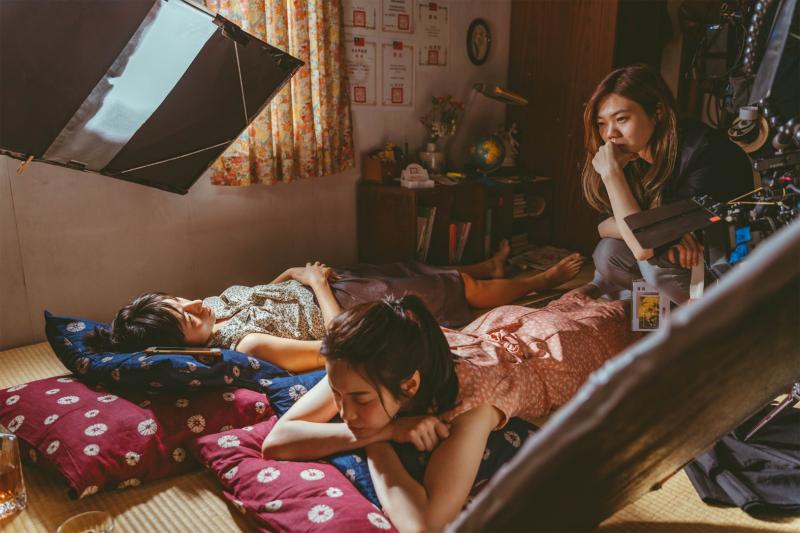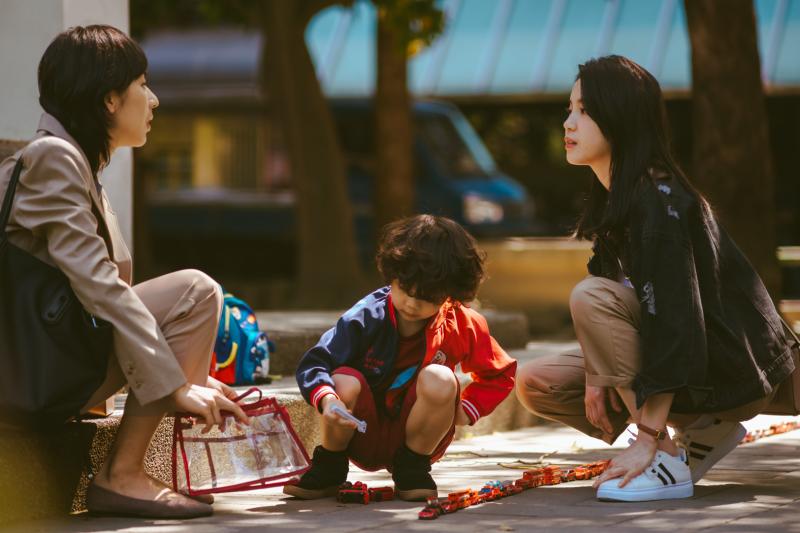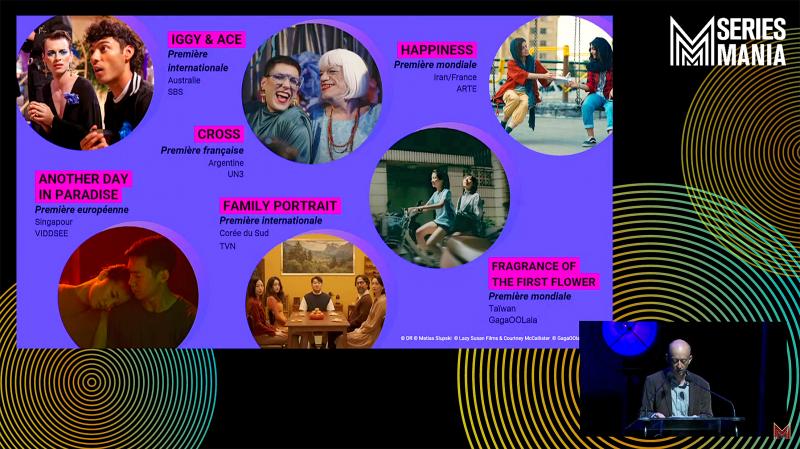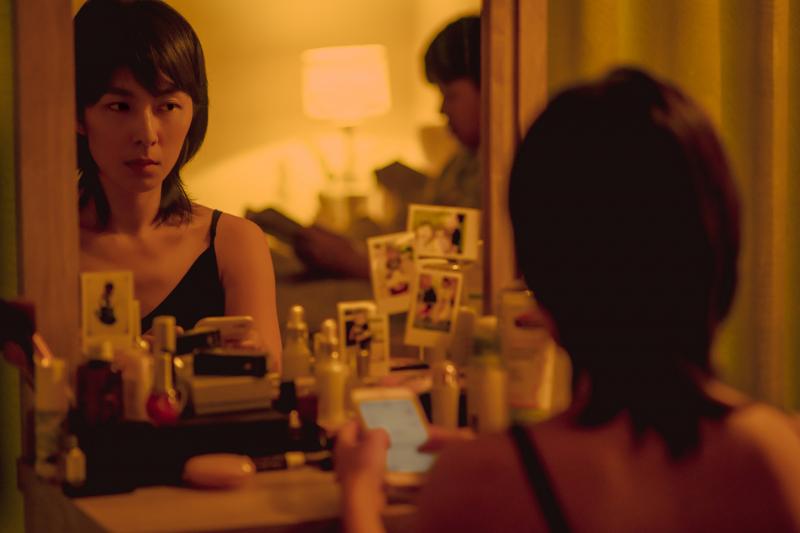In the first scene of Fragrance of the First Flower (第一次遇見花香的那刻), protagonist Yi-ming (Zaizai Lin, 林辰唏) accidentally wanders into a gay wedding.
“Although same-sex marriage is legal now, she’s still a little surprised by it,” director Angel Teng (鄧依涵) tells the Taipei Times. “It still hasn’t been completely accepted as the norm. There’s still a little conflict there, and I like highlighting these subtle details found in everyday situations.”
Legalization also had little impact on Yi-ming’s life, as she has a husband and son. But when she reconnects with her close high school friend Ting-ting (Lyan Cheng, 程予希), her suppressed emotions are awakened.

Photo courtesy of GagaOOLala
“She never figured out what her feelings meant back then,” Teng says. “And today, when society finally says that it’s okay to marry a woman, the decision isn’t really available to her anymore. There’s a sense of regret there. This film is not about blaming society for taking this long to push through legalization; it’s just a light-hearted drama where the audience can follow [Yi-ming and Ting-ting’s] relationship and come to their own realizations.”
The six-episode mini-drama series made headlines earlier this month as Taiwan’s first title to be officially selected to the prestigious French Series Mania International Festival, which runs from Aug. 26 to Sept. 2. The production evolved out of Teng’s script that won the Gold Award at last year’s inaugural GagaOOLala Pitching Sessions, which provides funding for original LGBTQ projects.
Frederic Lavigne, artistic director at Series Mania, praised Teng for being able to “find the right balance between frankness and caution,” noting that the story and characterization is “subtle and sensible” due to Lin and Chen’s “delicate interpretations.”

Photo courtesy of GagaOOLala
The series will be available on GagaOOLala’s streaming platform in September.
SUBTLE DIFFERENCES
With a masters degree in psychology, Teng says she enjoys observing changes in people and society, then presenting them visually in a way that’s neither too direct nor too restrained. With Fragrance of the First Flower, she wanted to explore the subtle differences before and after the legalization of same-sex marriage.

Photo courtesy of GagaOOLala
“Of course, ‘family values’ didn’t collapse like some said they would, but there also hasn’t been that many immediately noticeable shifts,” Teng says.
The script developed as the actors came on board — Lin was interesting to cast because she doesn’t fit the traditional housewife-mother type, but as a real-life mother, she also “radiates that maternal love,” Teng says. This led to Yi-ming’s background of being a free spirit shackled by an overprotective, traditional household, and the dissonance is clearly felt when watching Lin do household chores in her apron.
Teng says she consciously stayed away from the more stereotypical depiction of lesbian couples, with one more gender-netural and the other more feminine. “Some people do this so it’s easier for the audience to understand, but I want my characters to be real human beings with complex qualities.”

Photos courtesy of GagaOOLala
Teng also wanted to add some non-gender related elements from her personal life into the film to further break stereotypes — Yi-ming’s son has some autistic tendencies, but Teng draws from her educational background to create a character that differs greatly from most people’s impressions of an autistic child.
“It’s just like how people have their stereotypes of what LGBTQ people should be like,” Teng says. “I don’t want to point these things out directly; I prefer letting people notice the differences.”
As a volleyball player, Teng also feels that the sport is underrepresented in Taiwanese media. “The two women trained together when they were in high school and grew close then,” she says. “It just makes sense and I insisted on the setting. But the actors and the crew knew little about the sport, and the players helping out on set knew nothing about filming. It was chaotic, but I think we nailed it.”

Photo courtesy of GagaOOLala
TAIWANESE STORIES
Teng says her interest in highlighting gender issues began when taking a family psychology class in school about a decade ago.
“Not only was I not familiar about same-sex parent households, I noticed that all the examples that the professor gave were from overseas. The ones in Taiwan either weren’t standing out or weren’t being seen. A creative lightbulb went off in my head,” she says.
After deciding to switch to filmmaking, Teng studied directing at California Institute of the Arts and honed her trade at several prestigious production studios, including Walt Disney Imagineering.
Her first feature, Bao Bao (親愛的卵男日記) features a lesbian couple and a gay couple who team up to have kids in London, but later have to return to Taiwan where challenges await.
Last year’s short piece Rose Skirt (玫瑰色的裙) was inspired by Banqiao High School’s “manskirt week” controversy, where students fought for the right for males to wear skirts to school. While the well meaning students carried out the exercise in a playful, boisterous manner, the one boy in class who actually has cross-dressing desires remains silent.
“I wanted to approach the issue from a different angle,” Teng says. “When they assert that a man in a skirt is no big deal and that anyone of any sexuality can do it, it drowns out the voices of those who actually desire to do so. I used this conflict to weave a deeper, more delicate narrative.”
Both Bao Bao and Rose Skirt were made while Teng was based in the US, but they tell uniquely Taiwanese stories.
“The best outcome for me is to be able to make Taiwanese stories with Taiwanese actors, and then let them be seen and appreciated by an international audience,” Teng says.

This year will go down in the history books. Taiwan faces enormous turmoil and uncertainty in the coming months. Which political parties are in a good position to handle big changes? All of the main parties are beset with challenges. Taking stock, this column examined the Taiwan People’s Party (TPP) (“Huang Kuo-chang’s choking the life out of the TPP,” May 28, page 12), the Democratic Progressive Party (DPP) (“Challenges amid choppy waters for the DPP,” June 14, page 12) and the Chinese Nationalist Party (KMT) (“KMT struggles to seize opportunities as ‘interesting times’ loom,” June 20, page 11). Times like these can

June 23 to June 29 After capturing the walled city of Hsinchu on June 22, 1895, the Japanese hoped to quickly push south and seize control of Taiwan’s entire west coast — but their advance was stalled for more than a month. Not only did local Hakka fighters continue to cause them headaches, resistance forces even attempted to retake the city three times. “We had planned to occupy Anping (Tainan) and Takao (Kaohsiung) as soon as possible, but ever since we took Hsinchu, nearby bandits proclaiming to be ‘righteous people’ (義民) have been destroying train tracks and electrical cables, and gathering in villages

Dr. Y. Tony Yang, Associate Dean of Health Policy and Population Science at George Washington University, argued last week in a piece for the Taipei Times about former president Ma Ying-jeou (馬英九) leading a student delegation to the People’s Republic of China (PRC) that, “The real question is not whether Ma’s visit helps or hurts Taiwan — it is why Taiwan lacks a sophisticated, multi-track approach to one of the most complex geopolitical relationships in the world” (“Ma’s Visit, DPP’s Blind Spot,” June 18, page 8). Yang contends that the Democratic Progressive Party (DPP) has a blind spot: “By treating any

Swooping low over the banks of a Nile River tributary, an aid flight run by retired American military officers released a stream of food-stuffed sacks over a town emptied by fighting in South Sudan, a country wracked by conflict. Last week’s air drop was the latest in a controversial development — private contracting firms led by former US intelligence officers and military veterans delivering aid to some of the world’s deadliest conflict zones, in operations organized with governments that are combatants in the conflicts. The moves are roiling the global aid community, which warns of a more militarized, politicized and profit-seeking trend